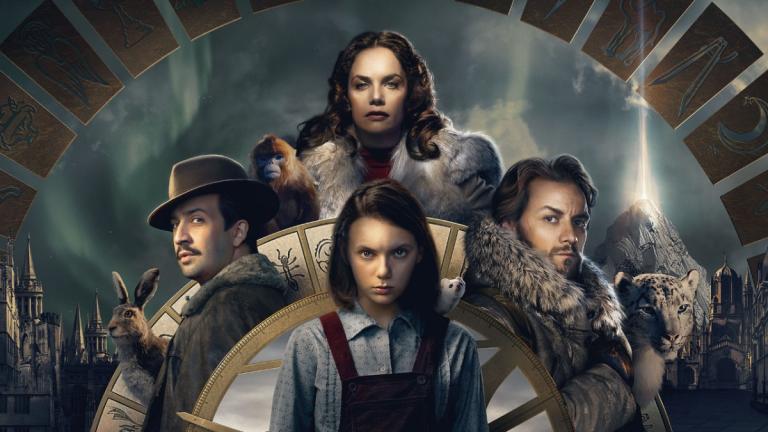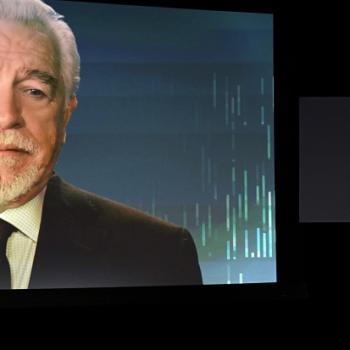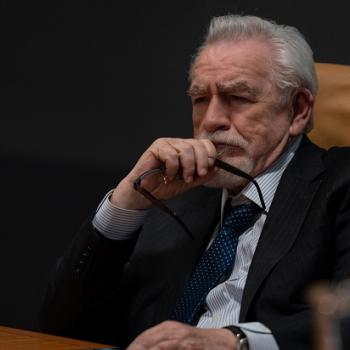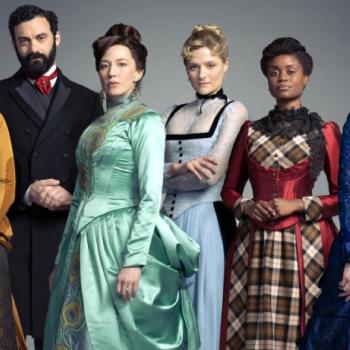
You might wonder why I haven’t written about HBO’s His Dark Materials before this, since it’s reputed to be an anti-religious screed. There are reasons.
First of all, I haven’t read the books (and I don’t intend to), so I wanted to see the whole show before making any judgments. Second, as I got into it, nothing about it compelled me to run to the keyboard. Third, it saved the really anti-religious stuff until the very end.
And fourth, HBO’s Silicon Valley was far superior. I’ll get to that in the next post.
First, His Dark Materials, based on the series of books by British author Philip Pullman, which recently ended its first season but is still available on HBO On Demand, and on HBO’s streaming services. I did see the pilot before attending the biannual TV Critics Association Press Tour in Beverly Hills this past summer. It was entertaining listening to the producers explain how the show wasn’t anti-religious nor attacking the Catholic Church in particular, only to see reporters who’d read the books Tweeting that yeah, it totally was, and it totally did.
It’ll take too long here to explain the whole alternate-world, “dust,” “daemons,” whatever thing that the show is about — and the books are apparently an upside-down version of Paradise Lost — but if you want the short course, click here.
All I knew was, the Big Bad in the show was called “The Magisterium” — the word for the teaching authority of the Catholic Church. Mentioned continuously and in ominous tones in the show, it didn’t do anything particularly religious, nor feed the hungry, clothe the naked, educate the ignorant, etc., which the Church also does, but it was very mean and anti-science. Leaving aside Galileo (which nobody understands anyway, but it’s explained here), the Church founded the first universities during the so-called Dark Ages, has bankrolled many scientific discoveries, boasts prominent scientists among its believers and clergy (including Copernicus, Gregor Mendel and others, here’s a list), and still runs its own observatory.
Also, at a big Harry Potter-type dinner at the show’s alternate-universe version of Oxford — which I call NotOxford — the main guy ended his recitation of pre-meal grace with “Christum Dominum nostrum” (Christ our Lord), which is this-world Christian and, being Latin, pretty specifically Catholic. So, was there a Christ in this world who gave His life for the salvation of all mankind? He’s never mentioned otherwise in the show, so, I don’t know. But tossing that in that rather contradicts the producers’ claims.
As for author Pullman, he’s a Brit, so it’s kind of rich that a guy from a country that has a state church, headed by its monarch — and where the Catholic Church hasn’t wielded any significant influence for centuries — to pick us as his chief antagonist. Well, I guess it wouldn’t get him into any trouble in Britain.
In one scene in the pilot, adventurer Lord Asriel — so like a Brit to make his hero an aristocrat — presents his scientific findings to NotOxford, and everyone there gets terribly upset about how The Magisterium will react to this forbidden knowledge. They do the equivalent of fingers in ears, la la la la, can’t hear this.
At the press conference, I pointed out that this kind of silencing of ideas and free speech happens all the time today at universities, but it’s not some overbearing authority dictating that from above, it’s instead coming from student activists and faculty. The actor who plays Lord Asriel, James McAvoy, bless ‘im, then launched into a spirited defense of free speech that probably wouldn’t go over well on many of today’s campuses.
As a side note, one of the conceits of this anti-religious story is that humans do have souls, but they are housed outside their bodies, in the form of shape-changing, sometimes-talking animals called “daemons” (pronounced “demons”). They don’t apparently eat or poop (that’s convenient), but they’re not spectral and have physical form — and can be injured or killed (taking their humans with them).
This is something that probably sounded good on paper but is kind of weird on screen. For one thing, it makes humans very vulnerable, since one lady is killed when a bad guy crushes her daemon butterfly. And, if the character is considered good, they get cool animals, like snow leopards or falcons or rabbits. Baddies often get bugs or snakes. That’s very species-ist.
Also, there are several scenes at NotOxford and other crowd scenes where everybody doesn’t get a visible critter (something Britain’s Radio Times also noticed). Maybe a little budget-saving?
Also central to the story is a strange device, the alethiometer, which, powered by mysterious, supernatural forces, tells the future — and “the truth” — through a language of esoteric symbols, rather like tarot cards, runes or a Ouija board. The show’s main protagonist, the girl Lyra (Dafnee Keen), has the power to read these prophecies easily. She’s the Chosen One, a bit like Buffy the Vampire Slayer.
And there are talking polar bears, who somehow make elaborate armor with their bear paws. OK.
Anyhoo, eventually I got to the last episode, where the ultimate Big Bad is revealed.
From Rolling Stone:
The Magisterium, [Lord Asriel] says, believes Dust is sin. The fact that it doesn’t attach itself to people until puberty has associated it in the eyes of the priests with the story of Adam and Eve. In this world, the first woman’s daemon settled on its final form only after she ate the serpent’s apple. To the religious organization, it’s all tied together, and they aim to eradicate it all to cement their tyrannical control. Lord Asriel, though, has set his sights on a more powerful enemy: the Authority, this world’s term for God.
Apparently, the Authority is just a mean old tyrant who doesn’t let you do what you want. OK. I’m just going to let Bishop Barron handle that one.
For me, His Dark Materials was slow, boring, silly in places, confusing and contradictory in other places, and altogether not fun. But, high fantasy is not my thing, and, as I always say, your results may vary.
The show will get a second season, but I’ve already done my time. You’re on your own now.
Now, in the next post, on to Silicon Valley … click here.
Image: HBO
Don’t miss a thing: Subscribe to all that I write at Authory.com/KateOHare.













